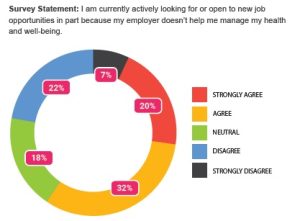It’s that time of year again. Time to start preparing (and indulging in) lavish meals, fighting over the last Black Friday deal, holiday parties and after holiday party, and making jolly when out of town guests arrive It’s the holiday season.
Feeling stressed yet? Your employees are, too.
Stress is a year-round issue, and employers know it wears their staff down. In fact, my company, LifeWorks, conducted research with HR.com and found that 71% of employers say their employees need help with managing their stress levels.
Those levels of stress only increase during the holidays, which can directly hurt employee well-being. If you’re not investing in  improving employee well-being, you may lose talent — 52% of employees are actively looking or open to new opportunities at least partially because their employer isn’t helping them manage their health and well-being.
improving employee well-being, you may lose talent — 52% of employees are actively looking or open to new opportunities at least partially because their employer isn’t helping them manage their health and well-being.
Here’s what is causing more workplace stress during the holidays, and how employers can help improve employee well-being:
Heavier Workloads
The holiday season means more time off — and less time to tackle your to-do list.
Acknowledge the stress that comes with the holiday season by making employees feel valued. ou can do this by offering specific praise for performance, sharing others’ praise with employees, and hosting celebrations.
Tip: Create a holiday-themed recognition program (e.g., “Deck the Halls with Boughs of Awesome”). Distribute “Holiday Hero” cards and encourage employees to write specific examples of their colleagues going the extra mile. Then, hang them up in a common area.
At the end of each week, gather teams and read them out loud. Host a “Fa La La Friday” celebration for employees who earned Holiday Hero cards and reward them with gifts.
Unhealthy Holiday Eating
As the holiday season approaches, granola bars are replaced with gingerbread cookies, fruit can only be found in pies, and eggnog joins coffee as another beverage option. This makes it easy for employees to rely on unhealthy food options throughout the day.
As our report found, this is not an uncommon problem in the workplace — 19% of employers say their employees need help eating healthier foods.
Nutrition is a major aspect of employee well-being that many people struggle to manage. But eating healthy doesn’t have to be hard or less satisfying.
Tip: Host a “Healthy Holidays” competition, where employees log what they eat and compete in a weight loss competition. At the end of the challenge, throw a healthy meal potluck party and announce winners. Reward them with health-related prizes, like fitness trackers, running shoes, and water bottles.
Financial Stress
Twenty-three percent of employers say their employees need help managing their finances, according to our study. And financial stress is only magnetized during the gift-giving season.
In fact, U.S. shoppers anticipate spending an average of $967 this holiday season, according to a survey by the National Retail Federation.
Play an active role in helping your employees manage this financial burden. Encourage employees to take advantage of financial resources available, like financial wellness workshops or budget planning seminars, to help them understand and control their personal finances.
Tip: Host a “Holiday Budgeting” workshop to help employees establish a responsible spending plan. Reward those who participate with “Elf Dollars” that they can spend on fun gifts in your holiday store.
When employees feel more in control and spend within their limits, they can better focus on managing their work responsibilities.
Depression
The holiday season is a time to feel grateful and celebratory, but for some, it may be a reminder of loved ones they lost or stir up sad memories. Circumstances in their personal life may cause mental health issues, like anxiety or depression. While mental health is a sensitive subject, you need to address it.
Tip: Break the stigma surrounding mental health by encouraging leadership to share personal stories about how they experience depression. They can be open about their symptoms and offer insights on how they manage it.
When you get employees comfortable talking about mental health, they’re more inclined to use counseling services through their employee assistance program (EAP), which boosts overall employee well-being.
If you want to make employees feel understood and supported, encourage them to form employee resource groups, where they meet weekly and openly discuss challenges and share solutions with each other.
Illness
The holiday season isn’t all singing carols and exchanging gifts. It introduces a lot of illness, like the common cold or the flu. The last thing you want is a sick employee sneezing in your office, spreading germs to the entire workforce. This will cause more sick days and higher levels of absenteeism.
Tip: To prevent colds from spreading, promote a policy to discourage sick employees from coming to work. Share the three R’s of beating a holiday season illness — rest, relax, and repeat.
Also, create and distribute a “Hygiene Handbook” to teach your staff proper hygiene. Host “hygiene huddles” to review tips on how to stay healthy and prevent spreading germs during the holiday season. An educated workforce is a healthier workforce.
Start improving employee well-being now to prevent these common obstacles during the holidays. When you help your staff prepare, they can better manage their health and stay productive throughout the end of the year.
How are you addressing employee well-being to help them survive the holidays?
